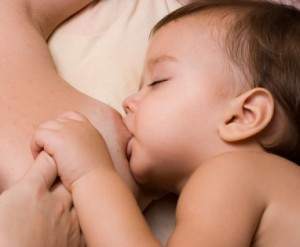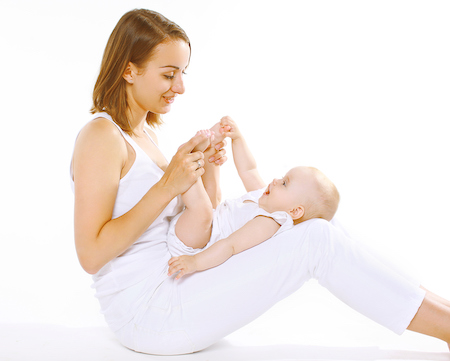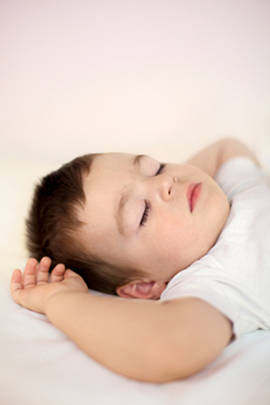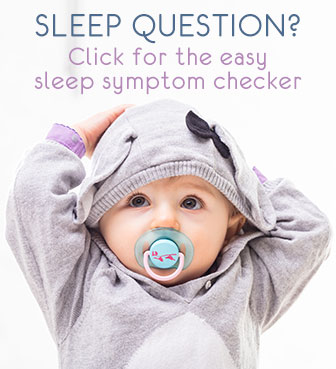How to Relieve Baby Gas to Improve Sleep
Author Name: Heidi Holvoet, PhD
Medical fact-check: Dr Leah Alexander, M.D., F.A.A.P.
Baby gas is usually harmless but can seriously disturb your baby's sleep at night. Luckily a gassy baby usually isn't ill and we can relieve gas with a few simple precautions to help your baby sleep soundly again.
Let's have a look at the most common causes for gas in babies, what foods cause gas, and how to get rid of baby gas fast. And we'll talk about the best sleep position for a gassy baby.
And specifics for both breast and bottle feeding.
RECOMMENDED RESOURCE Gas often coincides with one or more other common causes of night waking. How-to-recognize the symptoms and how to relieve gas as well as each of the other discomforts, are one part of the holistic approach in my award-winning Overcome Frequent Waking program, voted parents' favorite time and again!
What causes gas in babies?
The single best way to prevent and relieve your baby's gas is to understand what causes it.
The most common causes of baby gas are:

Cause 1. Immature digestive system (0-6 months)
In the first months, the stomach and digestive system are in full development. Your baby's digestive tract changes immensely between newborn and the age of 6 months old and is considered immature in the first half year.
- Poor digestion of milk
As a consequence, even breast milk and well-suited formula aren't always easily digested and can result in trapped gas that causes your baby discomfort. - Solid foods too soon
It's the same with solid foods started before the digestive tract matures sufficiently. (This is one reason why the WHO recommends starting solids, progressively, from 6 months old [1]).
Poor digestion can form gas bubbles that tickle the intestines. These gas bubbles stretch the bowel like air filling a balloon, resulting in discomfort.
Trapped wind is one of the noted causes of colic in infants (when healthy babies cry repeatedly, for a long time and with no apparent reason).
Cause 2. Feeding restlessly and/or quickly (all ages)
When a baby feeds restlessly or quickly, they take in too much air. This also causes wind.
When your baby swallows air, tiny gas bubbles can reach the intestine, stretching the bowel and it's the trapped air in their tummy that causes gas pains.
This can happen for breastfed babies as well as for bottle fed babies.
Cause 3. Not burped or held upright insufficiently (all ages)
To digest food well and for gas relief, young babies will usually need to burp several times during, and after feeding. That's both for breastfed and bottle fed babies and regardless of feeding position.
Older babies who no longer burp, will need some upright time (a minimum of 20 minutes) before lying down after a meal.
Cause 4. Foods that cause gas (all ages)
Certain foods are more likely to cause gas than others. This can be via what you eat when breastfeeding or through baby's food directly.
So what foods cause gas for babies? Foods that are best known to cause intestinal gas are green leafy vegetables, cabbage, broccoli, asparagus, onions, sprouts, beans, lentils.
These, along with soft drinks and spicy foods are the most typical foods to avoid when breastfeeding for gas.
Fruit, because of fructose and milk, because of lactose, can also cause gas for most babies.

Cause 5. Food sensitivities, allergies and intolerances (all ages)
Food sensitivities like lactose intolerance mean that some nutrients aren't digested properly and this causes bloating and a gassy baby.
With lactose intolerance there's insufficient lactase, the enzyme that should break down lactose in the small intestine. So the lactose arrives in the colon (large intestine) where its breakdown produces fatty acids and gases.
Also a milk allergy, typically an allergy to cow's milk, or soy allergies can cause gas in babies among other discomforts.
If your baby has a milk protein allergy for example, she might seem gassy but also have blood in her stools or have poor weight gain. If this is the case, you need to consult your pediatrician right away.
Note that a lactose intolerance and/or milk allergy have been linked with reflux[2]. Do discuss this with your doctor and discuss what they suggest to identify food sensitivities.
How to recognize gas pains in your baby
Apart from smelly winds, the symptoms of baby gas are:
- Cries (as if) in pain: gas pains can be quite severe
- Moans, groans, squirms, typically within an hour after feeding
- Gassy babies will typically cry, eyes closed, cramping up their tummy, stamping feet around, and wriggling uncomfortably
How to relieve baby gas?
To relieve your gassy baby and prevent gas long-term:
1. Burp your baby to prevent gas bubbles
Always burp your baby after feeding, whether breastfeeding or formula feeding.
Also burp when switching breast sides or half-way through a bottle. Ideally a baby should be burped several times during a feed by introducing brief interruptions. [3]
If your baby doesn't burp easily, try one of these 2 positions:
Gently lift your baby high on your shoulder, facing opposite to you, with a confident swift movement
Place your baby belly down on your lap (you're sitting) and gently pat their back.
Both of these burping positions reduce the abdominal muscle pressure and allow for easier burping [4].
You may have seen a burping position where your baby is sitting up and you hold their chin but it is usually less successful in releasing the majority of the gas. The other two positions mentioned just above, work better.
If your baby will typically fall asleep while feeding, do still hold them upright for a while after the feed. Aim to burp even when already asleep too.
2. Avoid restless and/or fast drinking
To ensure that your baby drinks calmly and doesn't take in too much air, avoid waiting until they're too hungry (this is not always possible of course, but try) and feed in a calm environment and state of mind if possible. Also, encourage slow eating:

AVOID EXCESS AIR When breastfeeding
Breastfed babies typically have less wind issues and less colic overall. Breast milk is more easily digested than formula and is less intrusive on the immature bowels.
A nursing baby typically swallows less air than when bottle feeding. That said, gas can still occur when breastfeeding, as it does when formula feeding. If your baby becomes gassy when nursing:
- If your baby is very eager, or you have a lot of milk coming out quickly, they may gasp in a lot of air while feeding.
To reduce a too high milk supply start with offering one breast only. Have your baby empty it completely and offer the second breast only if you cannot avoid it.
Ask me for further support if you suspect a too high milk supply.
Emptying the first breast well before offering the second is also important to help with digesting the milk (lactose) better so it's always best to do that. - The foods to avoid when breastfeeding for gas are green leafy vegetables, cabbage, broccoli, asparagus, onions, sprouts, beans, lentils, spicy foods, soft drinks.
- Some nursing moms notice an improvement when they drink fennel tea.
AVOID EXCESS AIR When formula feeding
With formula feeding your main goal is to prevent air from going in along with the formula:
- Use a correct size bottle nipple/teat with holes that are not too large or a slow flow nipple. These are helpful to encourage slower eating.
- Use a well-designed bottle that does not let in air. Dr. Brown's Natural Flow Bottles have been recommended by many moms with gassy babies, visiting this site.
- When preparing the formula: shake it in one bottle, then transfer into another one which you'll use for the feed. Shaking in the feeding bottle keeps more air bubbles trapped, which you want to avoid.
- Talk to your doctor or pharmacist to find a formula brand that suits your baby better - a lighter one can help relieve. Or one that doesn't contain cow's milk, any form of dairy, soy, or other nutrients that don't agree with your baby's digestive system and cause gas.
How to help your newborn baby with gas
To soothe gas pains in your newborn baby:
- a very gentle belly massage while holding their feet up while lying on their back for fast gas relief
- be extra mindful of avoiding too much air intake by drinking restless or too quickly (breast or bottle)
- when nursing, insist on emptying the first breast well (for maximal hind milk) before moving to the other side. Gassy newborns in particular benefit from the lactase in the hind milk, which aids with digestion
Gassy newborns are often in quite severe pain so assist with soothing and comforting as much as you can. Holding, rocking, laying on your lap or arms on their tummies, and carrying your newborn in a sling can all be amazing to relieve your tiny baby's discomfort now.
3. Go dairy-free
If you suspect gas due to lactose or dairy intolerance, or also if your baby's gas remains unexplained: consider going dairy-free as a self-test. This can be for you when breastfeeding and for your baby if formula feeding and/or eating solids.
Being dairy-free will include eliminating all non-vegan yogurt, cheese, milk and bread and cookies that contain any form of dairy or related ingredients. I also recommend to remain soy-free during this test.
If you see relief from a 2-week dairy-free test, you may need to keep it up for longer before gently re-introducing.
I then recommend you do this supervised by your doctor or nutritionist. It's important that your diets remain complete and healthy. This article does not replace medical advice.
4. Go back to milk-only if your baby's Gas may be due to starting solids too soon
If you started solids before 6 months, and your baby's gas is not otherwise explained: consider going back to exclusively feeding breast milk or formula until the digestive system has matured enough.
After a break period you can gradually start introducing solid foods again. For some babies, their digestive systems aren't ready till 7-8 months. That's why a gentle approach is safest.
5. Try gas drops or gripe water
Gas drop or grip water are an extra something you can try for treating gas pain, although parent and pediatrician opinions vary greatly.
I strongly recommend you discuss any brand or product option with your pediatrician to make sure it's safe to use.
Some products contain absolute no-no's such as caffeine and belladonna so be sure to avoid those. Ask you doctor about Simethicone, which can be truly effective for gas.
How to get rid of baby gas fast
If your baby is in pain now, try these tips to get rid of the gas pains fast:

1. Feet in the air!
Lay down your baby on their back in front of you. Have them safely on a blanket or a mattress on the floor, or on your large bed. Gently hold their feet up in the air to help the wind escape.
2. A relaxing and nice warm bath
A nice warm bath helps with calming overall, relaxing tummy muscles. The warmth on baby's belly can help get rid of more gas bubbles.
Some babies don't enjoy bathing so no need to force this is your baby isn't a fan. Instead, do a gentle massage (see below) or simply hold your baby close with a heating pad between you.
3. Belly massage!
Massage your baby's belly: place your little one safely on their back in front of you.
Make sure they're warm, and your hands are warm too.
Slowly and gently rub the tummy with your full hand: make clockwise spirals starting around the belly button and moving out and downwards. Combine this with the above (bath and feet up) for best results.
4. Bicycle!
Place a warm washcloth on your baby's belly while moving the legs in a bicycle motion. This can feel like a fun game for your baby and at the same time help to pass the gas.
5. Tummy time!
Tummy time helps relax the outer abdominal muscles and effectively helps relieve gas pain. You can do this to relieve your little one's gas troubles and also regularly otherwise, to help prevent more gas in future.

The best sleeping position for a gassy baby
The single best sleep position for a gassy baby is on the back.
Besides being the safest sleeping position - in fact the only safe one - it's also helpful for gas relief. When sleeping on the back, your baby can have their feet and legs up freely and that's a great way to get rid of some trapped air.
When you're next to your baby, are well awake, and monitor her continuously, you could have short naps on the tummy. As above, we know tummy time helps relax baby's belly muscles and reduces gas pain well.
Reminder: only do this when you're monitoring constantly and don't leave your baby to sleep on her tummy alone. This is important to minimize the risk of SIDS.
I don't advise to try and have your baby sleep with their head higher than their feet. This was advised in older days but is no longer deemed safe.
As much as your little one seems helpless and seems to be suffering, try not to worry too much about your gassy baby. Infant gas is truly harmless for most, though of course you want your baby not to be in pain.
The homemade remedies will help.
Apply each remedy consistently for at least one week to see if things improve, they take some time.
Soothe and comfort your baby in every way you can. Don't hold back - there's no risk of spoiling here! - because it is simply the best way to make her feel better.
Don't hesitate to contact me if nothing seems to be helping, I'm here for you!
Article Author: Heidi Holvoet, PhD - Founder, senior sleep consultant

Heidi Holvoet, PhD, is the founder of the Baby Sleep Advice website and movement, an award-winning author, baby & toddler sleep consultant with 17+ years experience as well as a certified lactation counselor.
Over the years, Heidi has received several awards inluding a Mom's Choice Award (MCA) and National Parenting Awards (NAPPA) for her Baby Sleep Advice website, programs and books. Also, Baby Sleep Advice was awarded "Most Trusted Infant's Sleep Solutions Company 2023" in the Benelux Enterprise Awards 2023.
Heidi continually conducts personal research and participates in continued education and in that way stays up to date with current scientific and pyschosocial infant care.

She is also a member of the Association of Professional Sleep Consultants of which she was one of the earliest contributors. She obtained her PhD degree in physics at the University of Ghent in Belgium.
Heidi is passionate about helping babies and their parents sleep more and better, with her trademark holistic and truly-no-tears approach that has been proven and praised time and again by parents worldwide to be effective and truly no-tears. Respect for you as a parent and your baby, is at the heart of Heidi's warm and kind support. Her approach always keeps in mind a baby's needs and abilities at any given age, is based on pediatric science and the most up to date knowledge in infant care and sleep science.
As well as the award-winning baby sleep programs, Heidi offers popular 1:1 consults and easy-access 30-minute SOS Sleep sessions.
Bibliography and Resources
[1] Infant and young child feeding World Health Organization, June 2021 https://www.who.int/news-room/fact-sheets/detail/infant-and-young-child-feeding
[2] Is the cause Food Allergy or Reflux Disease (GORD)? https://www.livingwithreflux.org/pdfs/lwr-allergy-leaflet.pdf
[3] Burping, hiccups and spitting up healthychildren.org https://www.healthychildren.org/English/ages-stages/baby/feeding-nutrition/Pages/Burping-Hiccups-and-Spitting-Up.aspx
[4] Burping your baby kidshealth.org https://kidshealth.org/en/parents/burping.html

Baby waking every hour?
by Heidi Holvoet, PhD

A Bedtime Routine: Settling To Sleep Like A Charm
by Heidi Holvoet, PhD

Separation Anxiety
by Heidi Holvoet, PhD

Colic
by Heidi Holvoet, PhD

Why does my baby wake up every hour?
by Heidi Holvoet, PhD




